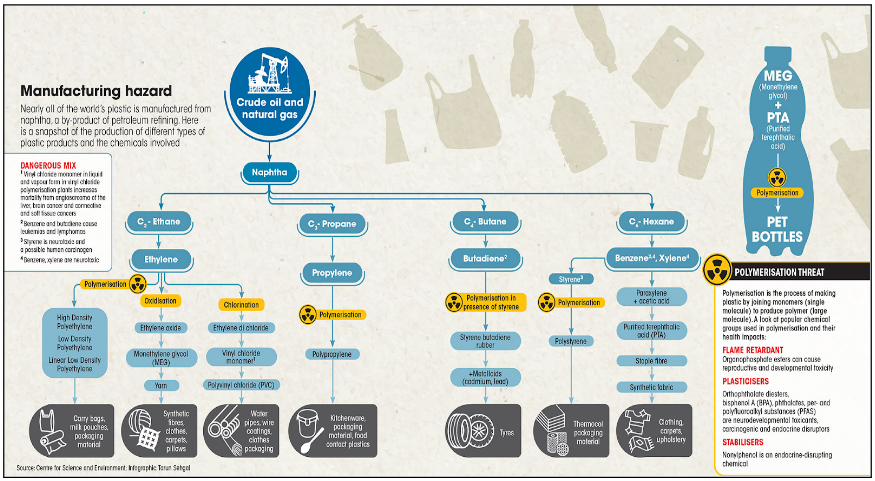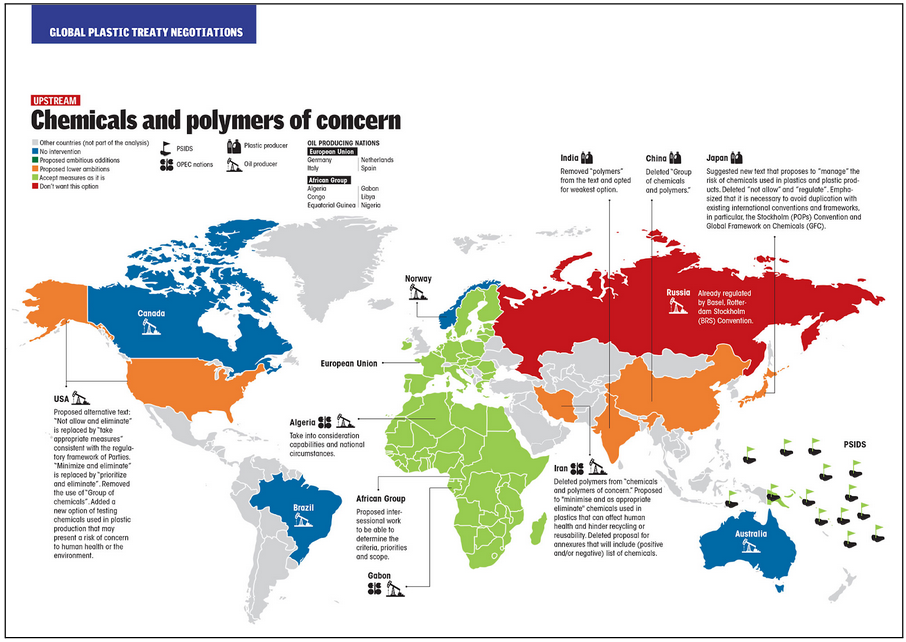GS Paper III
News Excerpts:
The terms "chemicals of concern" and "polymers of concern" denote specific chemical substances and types of polymers recognized for posing significant risks to human health and the environment across their life cycles.
More About the News:
- Extensive scientific evidence underscores the adverse impacts of various plastic chemicals, including monomers and additives, which contribute to a heightened disease burden and substantial health costs, particularly concerning endocrine disruption.
- Vulnerable populations such as marginalized communities, children, and women are disproportionately affected.

- Chemicals of concern: Chemicals of concern encompass additives such as plasticizers (e.g., phthalates), flame retardants (e.g., brominated compounds), colorants, and stabilizers used in plastic manufacturing.
- Renowned for their toxicity, persistence, and potential to bioaccumulate, these additives pose risks throughout production, use, and disposal by leaching into the environment.
- Negotiations focus on identifying and regulating these chemicals, advocating for safer alternatives, and implementing measures to minimize exposure.
- Polymers of concern:
- In the case of polymers of concern, certain plastics like expanded polystyrene (EPS) foam and specific types of polyvinyl chloride (PVC) pose environmental and health risks due to low recyclability, persistence, and potential release of hazardous substances during degradation.
- Discussions aim to address these challenges through targeted regulatory actions, innovation, and policy measures aimed at mitigating the impacts of plastic production and disposal.
- Proposed Approach: The proposed approach involves establishing a negative list of hazardous chemicals prohibited for use and a positive list of permissible chemicals subject to rigorous testing requirements.
- By concentrating on chemicals and polymers of concern, negotiations for a forthcoming instrument to end plastic pollution endeavor to protect ecosystems and public health from the adverse effects associated with hazardous plastic materials.
- Additionally, the goal is to promote sustainability and innovation in plastic management practices.
Status of Plastic waste in the world:
A new study predicts a staggering 220 million tonnes of plastic waste will be generated in 2024, with a 10 percent increase since 2021. Twelve countries account for 60 percent of mismanaged plastic waste, underscoring the urgency of global action. The upcoming UN Global Plastics Treaty negotiations in Ottawa are crucial for addressing this crisis and require science-driven, robust policy solutions to match the scale of the problem.
- Status of Negotiations: Negotiations aimed at ending plastic pollution on a global scale are being conducted under the auspices of the UN Environment Programme (UNEP).
- However, certain countries heavily involved in oil, gas, and plastic production, such as Saudi Arabia, Russia, and China, are impeding efforts to establish a comprehensive treaty that addresses both environmental and human health impacts of plastic pollution.
- Despite this, several countries and groups of nations have implemented regulatory systems to oversee the use of chemicals not only in plastic manufacturing but also in various other products.
- REACH of EU: One notable regulation is the European Union's Registration, Evaluation, Authorization, and Restriction of Chemicals (REACH) framework.
- Under REACH, companies manufacturing or importing chemicals into the EU are required to register substances with the European Chemicals Agency, providing detailed information on their properties, uses, and potential hazards.
- Substances of very high concern may be subject to authorization, and their use may be restricted or phased out if safer alternatives exist.
- Additionally, the EU can impose restrictions on hazardous chemicals if they pose unacceptable risks to human health or the environment.
- Individual countries, including Australia, Japan, the US, Canada, South Korea, China, and Taiwan, have their own regulations governing chemical use, some of which are as comprehensive as REACH.
- Status of India: India, for instance, opposes binding targets for reducing or phasing out plastic polymer production, emphasizing plastic as a waste management issue. While it agrees to some upstream measures, like regulating the use of chemicals of concern in plastic production
- Though India lacks a regulation identical to REACH, it has laws governing chemical registration, evaluation, and use.
- The Manufacture, Storage, and Import of Hazardous Chemicals Rules, 1989 is the key regulation. It requires registration of imported or exported hazardous chemicals and mandates safety measures to minimize environmental and health risks.

- However, there are gaps, such as lack of regulation on domestically manufactured chemicals and insufficient standards for chemicals used in plastic production, use, or recycling.
- India urgently needs a national policy to regulate its manufacturing industry, particularly given that 67 percent of its petrochemical refining capacity is dedicated to plastic production.
- Although standards exist for certain plastic applications, monitoring mechanisms and transparency are lacking. Moreover, the issue of non-disclosure of chemicals under trade secret protections needs to be addressed.
Conclusion:
The emphasis on chemicals and polymers of concern in negotiations for a future instrument to combat plastic pollution is aimed at safeguarding ecosystems and public health. By targeting these specific substances and materials known to pose significant risks, policymakers and stakeholders seek to implement effective measures to mitigate the adverse impacts of plastic pollution on the environment and human well-being. Ultimately, the goal is to create a framework that fosters sustainability, innovation, and collective action to address the global challenge of plastic pollution while protecting ecosystems and public health for present and future generations.


